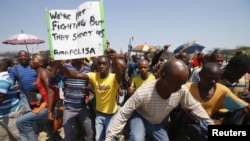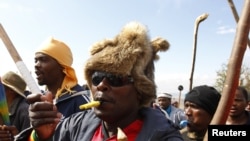JOHANNESBURG —
South Africa has seen months of violent, mostly illegal, strikes that are spreading to near epidemic levels. While the nation is no stranger to labor action, this year’s stoppages are having widespread effects and are exposing some critical weakness in the country.
It all started in August when some 3,000 workers at South Africa’s Lonmin platinum mine decided they weren’t happy with their union. So they went on strike for higher wages without union approval, massing on a chilly hilltop outside the mine in Marikana and facing off against police. In the end, they got a substantial raise after six weeks of violent wildcat strikes.
That winter of discontent has turned into spring and is now threatening to go straight through the South African summer as well. Strikes in the country have spread like wildfire, sparking violence, shortages of goods, political backlash and economic consequences.
The strikes spread to other mining companies and have now hit the transport industry. That latest stoppage poses a threat to the economic hub of Johannesburg, as fuel producer Shell said it can’t honor its delivery contracts to the sprawling, car-dependent city.
The strikes are also having international effects. Lonmin and Anglo American Platinum have each lost millions of dollars. On October 5, Anglo American fired 12,000 workers after three weeks of work stoppages. In response, the South African rand Monday hit its lowest point in more than three years, at nearly nine rand to the U.S. dollar.
Patrick Craven, a spokesman for the powerful Congress of South African Trade Unions, said his federation has been warning the government and employers that South Africa’s deep inequality is a “ticking time bomb.”
“And that what basically has happened in the last few months is that one of the bombs has exploded. But it’s now spread right through the platinum sector into the gold sector and outside mining altogether. And clearly it’s a result of expectations being raised amongst workers that they can in fact get far more, and they’re absolutely right to demand more. And of course particularly when Lonmin reached a settlement with the striking miners who were acting independently of their trade union, it created a feeling amongst the other workers that ‘well, if they can do it, why can’t we?,’” Craven said.
Politician Ian Ollis is a member of the opposition Democratic Alliance party and serves as the party’s shadow minister of transport. He previously was shadow minister of labor. Ollis said the transport strikes are clearly influenced by the mining strikes.
“We’re seeing a second wave of strike action now in the transportation sector, where we’ve seen trucks petrol-bombed and burning on highways, particularly in Gauteng, Johannesburg and in the city of Cape Town. And it seems as though his sort of violence has carried over from the mining sector into the transportation sector,” Ollis said.
Ollis believes the strikes have also exposed critical weaknesses in at least two key institutions.
“The Lonmin strike certainly showed that there are weaknesses in the South African police service. The police dealt appallingly badly with the violence at the Lonmin strike, and the methods that were used to quell the violence and to control the strike are seen now by the public to at last be quite excessive, where 44 people were killed, either by the police or by striking miners at Lonmin. There’s a significant amount of blame being put on the police. Secondly, of course the unions themselves did not do enough, in my opinion, to reduce the violence and the confrontation at the Lonmin strike,” he said.
Perhaps more worryingly, violence is continuing after the strikes have ended. Over the weekend, a National Union of Mineworkers (NUM) branch manager was shot dead just days after the man played a key role in a government commission of inquiry into the events in Marikana.
Police spokeswoman Emelda Setlhako gave a chilling description of the act.
"According to eyewitnesses, the victim was attacked by an unknown gunman," Setlhako said. "The gunman entered the room and fired several shots at the victim and left him for dead."
No suspects have been identified and she said there was no clear motive, although NUM spokesman Lesiba Seshoka said the man was likely targeted for his role in the inquiry.
And then, finally, there’s the political toll. President Jacob Zuma has taken a hefty helping of political backlash for his handling of the strikes.
These issues are likely to come to the fore in December, when the ruling African National Congress holds its party conference and chooses its leader for next year’s general election.
It all started in August when some 3,000 workers at South Africa’s Lonmin platinum mine decided they weren’t happy with their union. So they went on strike for higher wages without union approval, massing on a chilly hilltop outside the mine in Marikana and facing off against police. In the end, they got a substantial raise after six weeks of violent wildcat strikes.
That winter of discontent has turned into spring and is now threatening to go straight through the South African summer as well. Strikes in the country have spread like wildfire, sparking violence, shortages of goods, political backlash and economic consequences.
The strikes spread to other mining companies and have now hit the transport industry. That latest stoppage poses a threat to the economic hub of Johannesburg, as fuel producer Shell said it can’t honor its delivery contracts to the sprawling, car-dependent city.
The strikes are also having international effects. Lonmin and Anglo American Platinum have each lost millions of dollars. On October 5, Anglo American fired 12,000 workers after three weeks of work stoppages. In response, the South African rand Monday hit its lowest point in more than three years, at nearly nine rand to the U.S. dollar.
Patrick Craven, a spokesman for the powerful Congress of South African Trade Unions, said his federation has been warning the government and employers that South Africa’s deep inequality is a “ticking time bomb.”
“And that what basically has happened in the last few months is that one of the bombs has exploded. But it’s now spread right through the platinum sector into the gold sector and outside mining altogether. And clearly it’s a result of expectations being raised amongst workers that they can in fact get far more, and they’re absolutely right to demand more. And of course particularly when Lonmin reached a settlement with the striking miners who were acting independently of their trade union, it created a feeling amongst the other workers that ‘well, if they can do it, why can’t we?,’” Craven said.
Politician Ian Ollis is a member of the opposition Democratic Alliance party and serves as the party’s shadow minister of transport. He previously was shadow minister of labor. Ollis said the transport strikes are clearly influenced by the mining strikes.
“We’re seeing a second wave of strike action now in the transportation sector, where we’ve seen trucks petrol-bombed and burning on highways, particularly in Gauteng, Johannesburg and in the city of Cape Town. And it seems as though his sort of violence has carried over from the mining sector into the transportation sector,” Ollis said.
Ollis believes the strikes have also exposed critical weaknesses in at least two key institutions.
“The Lonmin strike certainly showed that there are weaknesses in the South African police service. The police dealt appallingly badly with the violence at the Lonmin strike, and the methods that were used to quell the violence and to control the strike are seen now by the public to at last be quite excessive, where 44 people were killed, either by the police or by striking miners at Lonmin. There’s a significant amount of blame being put on the police. Secondly, of course the unions themselves did not do enough, in my opinion, to reduce the violence and the confrontation at the Lonmin strike,” he said.
Perhaps more worryingly, violence is continuing after the strikes have ended. Over the weekend, a National Union of Mineworkers (NUM) branch manager was shot dead just days after the man played a key role in a government commission of inquiry into the events in Marikana.
Police spokeswoman Emelda Setlhako gave a chilling description of the act.
"According to eyewitnesses, the victim was attacked by an unknown gunman," Setlhako said. "The gunman entered the room and fired several shots at the victim and left him for dead."
No suspects have been identified and she said there was no clear motive, although NUM spokesman Lesiba Seshoka said the man was likely targeted for his role in the inquiry.
And then, finally, there’s the political toll. President Jacob Zuma has taken a hefty helping of political backlash for his handling of the strikes.
These issues are likely to come to the fore in December, when the ruling African National Congress holds its party conference and chooses its leader for next year’s general election.





